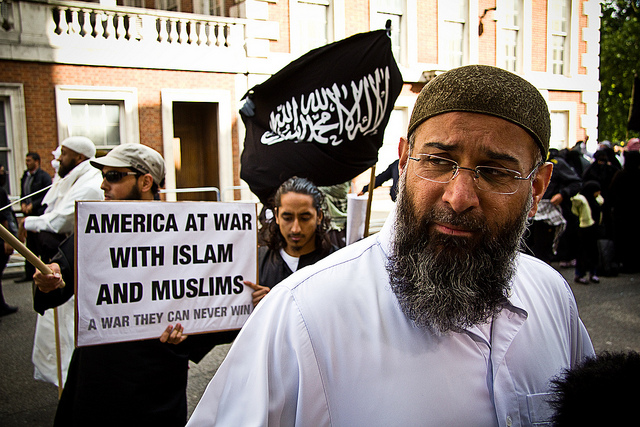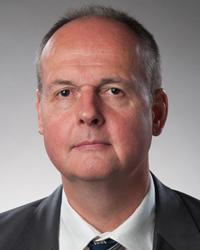Charging the likes of Anjem Choudary for what he says should concern all of us who want to win the battle of ideas
The radical Islamist preacher Anjem Choudary is facing charges following his arrest for comments made in support of the Islamic State. Here, Bill Durodié argues that arresting people for the things that they say is probably, in the long-term, counter-productive, as it will not help win the battle of ideas against Islamism. Furthermore, he argues that causing offence is no excuse to incarcerate anyone.

Credit: Dan H, CC BY NC 2.0
The high profile, UK-based, Islamist firebrand Anjem Choudary has been charged under Section 12 of the UK’s Terrorism Act 2000 with inviting support for the so-called Islamic State group (IS) in lectures that were subsequently published online. For the purposes of the Act, IS is a proscribed organisation, encouraging support for which is an offence. More specifically however, we ought to situate the decision to only move against Choudary and another man, Mohammed Mizanur Rahman now, in the context of recent pronouncements by the Prime Minister, David Cameron, and his Home Secretary, Theresa May, to the effect that the authorities would pursue not just those who commit acts of violence but those who promote it in others.
In an earlier, related speech from May of this year, Cameron had ominously announce that; “For too long, we have been a passively tolerant society, saying to our citizens ‘as long as you obey the law, we will leave you alone.’” With these words to the National Security Council, the then only just recently re-elected PM had laid out his intention to establish new powers to make it harder for people to promote so-called extremist views. His reappointed Home Secretary Theresa May had already introduced new legislation earlier in the year that mandated those in specified authorities – including schools, colleges, and universities – to take measures “to prevent people from being drawn into terrorism” (a notably passive formulation).
They appear to be in good company. A supportive article in the establishment paper The Telegraph ran under the title “Britain is too tolerant of the intolerant.” And it is not just conservatives who hold such a position. Many liberals, as well as those on the old left of the political spectrum, seek to have those whose opinions they oppose banned from speaking in public. Some Muslim community leaders now see their role as “protecting our younger generation from the toxic effects of extremist propaganda”, too. Even a few academics have been arguing as much for years.
But aside from the small matter of who defines what is “extremist” – a task legal professionals will most likely relish – these individuals betray their failure to understand what tolerance really is, revealing a low view of freedom and other people, and a complete absence of any purposive vision of their own for society.
“I disapprove of what you say, but I will defend to the death your right to say it” – the apocryphal phrase attributed to the French Enlightenment philosopher Voltaire is as good a place to start as any in elucidating these points. Tolerance, in this sense, can never be passive as Cameron suggested. It starts from disapproval, which is an active judgment. Only the non-judgmental – an attitude unfortunately encouraged by contemporary multiculturalism – are passive. And accordingly, they are not tolerant either – just indifferent, turning a blind eye to the beliefs and actions of others.
True tolerance, as Voltaire’s predecessor the English philosopher John Locke understood full well, requires ruthlessly engaging those whose opinions you disagree with, while agreeing not to censor them or resort to violence. It is an acceptance that the world is uncertain and a willingness to be open to the possibility of your own error or partiality. It needs absolute freedom of expression, both to prevent viewpoints being banned or hidden from view, and to allow all parties to better develop their own position or understanding.
And after Locke and Voltaire, John Stuart Mill, author of On Liberty, would no doubt have balked at the notion that someone inviting others to join a group should be held responsible for the ensuing actions of any who actually did. Invoking IS is not the same as falsely shouting ‘fire’ in a crowded theatre, as unlike that word, and others designed to elicit unmediated responses, any want-to-be jihadist would have plenty of time to be held independently accountable for their actions.
Such reasoning lies at the heart of what a university is. Indeed, it is why many choose to go there – to have the opportunity to put their ideas to the test (no matter how outlandish they may be), and, in turn, to test others. To deny this to the young – for fear that supposedly bad ideas may have “toxic effects” – is to view and treat them as infants. Sadly, this is a position already adopted by successive heads of the British Security Service (MI5), who have described their concerns of young adults being “vulnerable” or “groomed” into becoming terrorists.
As at least one commentator has noticed, this approach turns the war on terror into a child protection issue that draws on contemporary social fears regarding pedophiles. It presents young people as mindless sheep in need of protection. Yet, the recent actions of several youth who made their way to join IS in Syria suggests the opposite is true. These are bright, energetic, and willful individuals in search of something to believe in, which is also necessarily an indictment of what they are provided with at home – in the West.
At home, they see politicians who have given up on the need to engage and inspire, and who would rather be seen to censor and regulate (despite the fact that many of them marched in support of free speech in solidarity with the cartoonists murdered in France earlier this year).
Similarly, universities that know the new legislation to be unnecessary and unworkable – let alone opposed to the spirit of a liberal education – will, nevertheless, introduce new procedures and audits to be seen to be in compliance with government diktat. Little wonder that those in search of a real purpose and meaning to their lives are left to look for this elsewhere.
By seeking to ban the opinions they disapprove of, our leaders implicitly reveal their weaknesses – both in failing to engage with and argue against those they so stridently reject, and, even more so, in having nothing more positive to put forward as a vision of their own. In doing so, they do not make society more tolerant, but more authoritarian – and blindly so, to boot, for what is it that they want people to be de-radicalized to?
Ironically, for those who would remove the oxygen of publicity from unrepresentative individuals, Anjem Choudhury will receive more profile through this than he would otherwise have. He last achieved notoriety after the Charlie Hebdo related killings at the start of the year in a comment for USA Today where he argued that governments should not “provoke Muslims”. But who is it exactly that believes that causing offence is the worst offence of all and who seeks to ban and incarcerate people accordingly?
Choudhury and his ilk are fantasists who represent no-one. Charging them for, as one commentator has put it, “talking bollocks”, should be of concern to all those who would hope to win the battle of ideas through argument rather than using blind force. Worse, it presumes and projects the rest of us to be mindless automatons responding violently to their vacuous rants.
—
Note: elements of this post originally appeared as By Banning Those They Reject, Our Leaders Reveal Their Own Crisis on The Mark News. It represents the views of the author and not those of Democratic Audit UK or the LSE. Please read our comments policy before posting.
—
 Bill Durodié is Professor of International Relations at the University of Bath. He is the author of “War on Terror or a Search for Meaning?” a contribution to a 2013 US Joint Chiefs of Staff and Department of Defense White Paper that sought to re-evaluate counter-terrorism policies in the light of recent incidents in Boston and Woolwich.
Bill Durodié is Professor of International Relations at the University of Bath. He is the author of “War on Terror or a Search for Meaning?” a contribution to a 2013 US Joint Chiefs of Staff and Department of Defense White Paper that sought to re-evaluate counter-terrorism policies in the light of recent incidents in Boston and Woolwich.





 Democratic Audit's core funding is provided by the Joseph Rowntree Charitable Trust. Additional funding is provided by the London School of Economics.
Democratic Audit's core funding is provided by the Joseph Rowntree Charitable Trust. Additional funding is provided by the London School of Economics.
Whilst I fully support the democratic right to freedom of speech, thought, and expression, there is a world of difference between that and someone who is constantly, and openly, inciting violence, racial and religious hatred, and determined to undermine British culture and replace it with a Caliphate, imposing Sharia law and exterminating “infidels (that’s you and I). We have not even begun to speak about his physical activities, such as urging youngsters to go and fight for ISIS, and most probably fundraising for them as well. ISIS has formally declared war on the west, therefore Anjem Choudary is a “traitor” to Great Britain and should have been imprisoned or deported long ago. The only reason the establishment have acted now, is because David Cameron senses that the mood of the British people is changing rapidly, and they all fear for their careers, lest they get voted out in the coming elections.
RT @LSEPubAffairs: Charging the likes of Anjem Choudary for what he says should concern to all us who want to win the battle of ideas http:…
Actually, an apocryphal remark attributed to Voltaire is not ‘as good a place to start as any’ in this context. The obvious place to start, bizarrely unmentioned here, is the international rights regime, specifically Article 19 of the International Covenant on Civil and Political Rights, which establishes freedom of expression as a human right but also defines limits to it. There is plenty of space to argue on either side of the argument around this, but the proper starting point for that argument is this established international legal framework.
Well, if we stick to the law, then Section 12 of the Terrorism Act 2000 suffices, as the author notes. Presumably, the point of bringing in more philosophical perspectives – such as Voltaire, Hume and Mill – is to remind ourselves that we need not restrict ourselves that way. The law reflects the mood of the times, which can be dangerous when many disengage. The limits to freedom of expression in Human Rights legislation is an exemplar of this. There are no limits in the First Amendment, born of a more optimistic age.
Interesting piece on the free speech implications of Anjem Choudary on @democraticaudit by Bill Durodie https://t.co/1WQqz6PAOV
Chair of International Relations, Prof Bill Durodie @PoLIS_Bath blogs for @democraticaudit on Anjem Choudary https://t.co/f8psTrZ24F
A critical take: Charging Anjem Choudary for what he says should concern all who want to win the battle of ideas https://t.co/1gHI0esRN1
Charging the likes of Anjem Choudary for what he says should concern all of us who want to win the battle of ideas https://t.co/ozpgDNnZc9
Charging the likes of Anjem Choudary for what he says should concern to all us who want to win the battle of ideas https://t.co/66GHYPkmL4…
Charging the likes of Anjem Choudary for what he says should concern to all us who want to… https://t.co/tNmnvagrc6 https://t.co/WiFFdHGssD